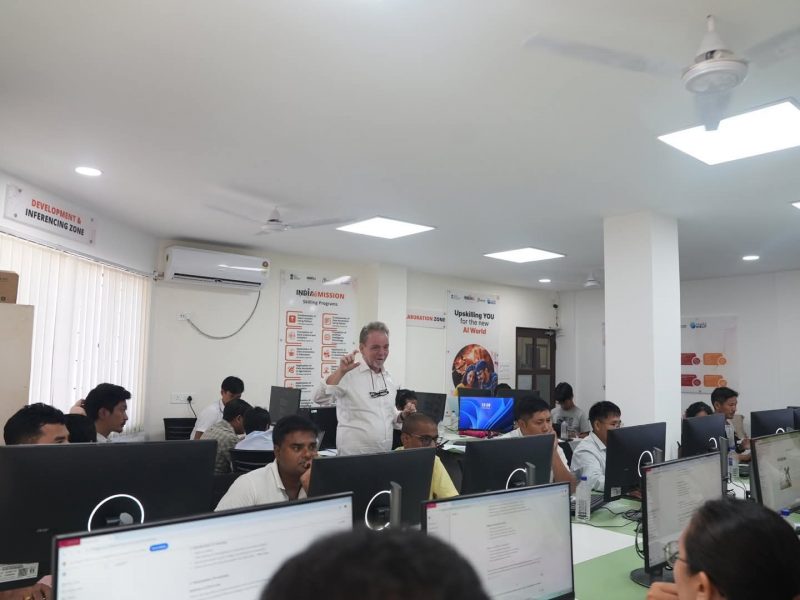My news stream for Higher Education in India: Numbers continue to grow | Push for campuses of foreign HEIs | digital Central Academic Bank of Credits (ABC) becomes mandatory | Regression in India’s Academic Freedom Index score
Enrolment in higher education institutions increased to 4.14 crore during 2020-21, crossing the 4-crore mark for first time
Times of India
Higher Education numbers in India continue to grow
On February 1st, the Indian finance minister Nirmala Sitharaman delivered the budget speech for the union budget 2023-34. It includes rises for Education as well as for Higher Education. The Higher Education budget 23/24 (pdf) has increased by about 8%, from Rs 410 billion in 2022-23 to Rs 441 billion in 2023-24. The whole Budget for the Ministry of Education increases also by 8% to Rs 1,1 trillion. A comprehensive analyses of the figures (pdf) ist done by PRS Legislative Research.
According to the recommendations of the National Education Policy 2020 (NEP) (pdf) the share of GDP spent on education should be 6% to achieve the ambitious targets; today it is 3% of the GDP. However, this is also criticised. For various digitalisation initiatives in HE (“Digital India e-learning”), the budget also provides 4.2 billion rupees, which has remained fairly unchanged over the past few years.
According to the All India Survey on Higher Education (AISHE) – Report 2020-21 at the about 1.100 Universities and 44.000 Colleges the number of students enrolled increase to about 41 million and the estimated Gross Enrolment Ratio rises above 27%, the highest figures ever.
URLs in order of appearance
MINISTRY OF EDUCATION, DEMAND NO. 26, Department of Higher Education (PDF)
Rao, S. M. (2023). Demand for Grants 2023-24 Analysis Education. PRS Legislative Research (PDF)
09.03.2023 – Budget 2023 is a case of education taking a hit – The Hindu
07.02.2023 – Wiss-Nama Newsletter February 2023 – Federal Foreign Office
29.01.2023 – Ministry of Education releases All India Survey on Higher Education (AISHE) 2020-2021
Ensure that all our students have access to quality education at the international level.
M. Jagadesh Kumar
Push for campuses of foreign HEIs in India
The government is moving forward with a plan to encourage foreign higher education institutions (FHEIs) to open campuses in India. Following the projections of the National Education Policy 2020 (NEP), the University Grant Commission (UGC) released a draft regulation for the establishment and operation of campuses of foreign higher education institutions in India (PDF) in early January. Although international branch campuses are not new, this is the first time India has opened its higher education system to this possibility. According to University Grants Commission (UGC) Chairman M. Jagadesh Kumar, the draft aims to “…ensure that all our students – there are about 40 million seeking higher education – have access to quality education at the international level. At the very least, it minimizes the cost of living compared to studying abroad.”
However, foreign universities must meet certain standards and regulations to do so. FHEIs must have a top 500 ranking or be a “reputed institution” in their home country. FHEIs have relatively broad autonomy in designing fee structures, admissions procedures, and hiring faculty and staff, including salaries and conditions of service. FHEIs will not be allowed to offer degree programs online. They are permitted to transfer profits to their home universities. “However, the FHEI must ensure that the qualifications of appointed teachers are equivalent to those of the main university in the country of origin. It shall ensure that the foreign faculty who are to teach at the Indian university remain at the university in India for a reasonable period of time” the Economic Times explains.
Reaction to the bill has been divided. Questions are raised about what kind of FHEIs will come to India and for what reasons. There is a great deal of skepticism as to whether regulation will produce the desired result or whether it will only lead to further competition in higher education in which public universities will not be able to compete. “With this, the Indian higher education system will have two distinct parts – one of which will be foreign ‘owned’ and governed almost entirely by regulations other than those the UGC enforces on Indian universities.” comments Frontline magazine.
URLs in order of appearance
09.02.2023 – Government plan to let foreign universities enter India raises concerns – Frontline
It is our aim to onboard all students in central universities in the ABC platform in the upcoming academic year.
M. Jagadesh Kumar
Indian digital Central Academic Bank of Credits (ABC) becomes mandatory
The Academic Bank of Credits (ABC) is a national digital platform that centrally records the academic achievements of Indian students and, in combination with a changed study structure, is intended to enable more flexible studying. Already operational since 2021, the ABC system is now to be introduced more intensively. Circulars, public hearings, and flagship projects will be used to further establish the ABC system. To this end, all universities have been encouraged to register as an institution in the system and to encourage students to create their own personal accounts. Now, the University Grant Commission (UGC) has declared that, starting this year, registration in the ABC system will be mandatory for access to universities.
The platform is developed and operated by the national e-governance department of the Ministry of Electronics and Information Technology under the so-called DigiLocker framework, which is a personal electronic data and document locker. ABC is part of the comprehensive renovation of India’s higher education system under the National Education Policy 2020 (NEP). Together with a study structure reform (outcome orientation), digital study offers and the ABC system, students are to be given the following opportunities:
- Earned credit points stored in personal DigiLocker can be used for up to seven years to count toward degrees.
- Credit points can be accumulated from courses taken at different HEIs. Credit for such courses must be awarded by the HEI in which the student is enrolled.
- Credit points earned in courses from the national platform SWAYAM can be recognized. Universities are encouraged to recognize up to 40% of the required course credits if they were earned on the SWAYAM MOOC platform. SWAYAM is to be supplemented in the coming period by a central Indian National Digital University (NDU). The NDU will also be able to award degrees.
However, students are currently having difficulty registering on the ABC platform because the national civic database Aadhaar, their cell phone number and the registration process on the ABC platform are intertwined, the newspapers report.
Centralization, bureaucratization, and politicization has historically produced weak university autonomy in India
Academic Freedom Index – 2023 Update
Regression in India’s Academic Freedom Index score.
According the recent V-DEM 2023 Academic Freedom Index (PDF) India’s recent ranking has dropped to 0.38, where 1 represents the highest score. India thus belongs to the bottom 20-30% bracket of countries, with a negative trend in recent years. The report concludes “Although there is undoubtedly sub-national variation at institutional level and across disciplines, it is noteworthy that the freedom to research and teach and the freedom to exchange research findings are less constrained than the other dimensions of academic freedom”.
Although India’s government normally refuses to recognize international indexing systems (PDF), arguing that they often rely on the judgment of a group of anonymous experts, there have been some contributors as early as 2022 raising concerns about the future of academic culture in India. The Wire listed incidents spanning more than 10 years that indicate the difficulties Indian colleges are going through. Incidents such as the cancellation of a left-wing inspired academic conference at IIT Bombay in December 2022 are fueling these growing concerns.
The nomination system for university rectors (V-Cs) also triggered a public debate last year. The heart of the problem is that state and territory governors have the power to propose or reject the nomination of V-Cs at certain institutions (which is also a not uncommon system in other countries). Last year, this issue was raised by an order from the State Governor of Kerala demanding the resignation of nine V-Cs in universities.
Nevertheless, it should be noted that, on the one hand, the downturn in India’s academic freedom value already began in 2013, i.e. before the election victory of the still governing BJP, and on the other hand, Indian government policy itself makes use of indexing systems when they seem appropriate, such as the global university rankings.
URLs in order of appearance
V-DEM 2023 Academic Freedom Index (PDF)
03.03.2023 – India Has Significantly Less Academic Freedom Now Than 10 Years Ago: New V-Dem Report
21.07.2022 – Academic freedom is under threat in India
04.10.2022 – Six Tables that Tell the Story of Academic Unfreedom in India – thewire
12.11.2022 – Selection of Vice-Chancellors
02.01.2023 – India’s political spats over v-c appointments must end | Times Higher Education (THE)

Public Domain Dedication



